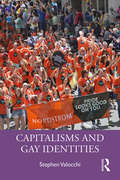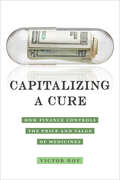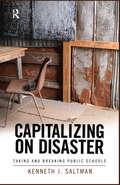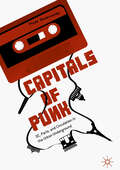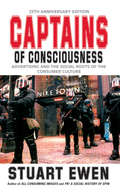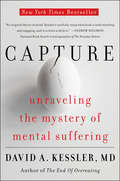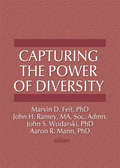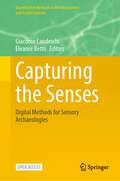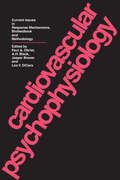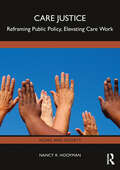- Table View
- List View
Capitalisms and Democracies: Can Growth and Equality be Reconciled? (Routledge Advances in Sociology)
by Carlo TrigiliaThis book examines steadily-growing increases in inequality within Western capitalist democracies, examining with care the differences between these democracies rooted in their culture and institutions. It highlights the differences in growth and inequalities between different countries, pointing to the role of endogenous institutions that affect social inequalities as well as the relationship between redistribution and economic growth. The book presents extensive comparative research on institutional factors such as industrial relations, welfare systems, training and innovation policies. Paying attention to diverse types of democracies and to the main features of left-wing parties, the book highlights the importance of politics, and of different types of democracies, in shaping social inequalities and diverse development paths. It will appeal to students and scholars interested in economic and labour sociology, welfare studies, comparative political economy, comparative welfare, varieties of capitalism, and comparative politics. The Open Access version of this book, available at www.taylorfrancis.com, has been made available under a Creative Commons Attribution- Non Commercial-No Derivatives 4.0 license.
Capitalisms and Gay Identities
by Stephen ValocchiIn this important text, Stephen Valocchi brings capitalism back into the study of the gay and lesbian movement. He argues that to understand the collective identity, structure, strategies and goals of the movement, we need to understand the role that capitalism and the state have played. While capitalism and the state have figured centrally in earlier analyses of social movements, these important institutions and their social processes are no longer central concerns of the theory and research of social movements in the United States. Capitalisms and Gay Identities examines how the class-based inequalities and changing class structures of capitalism interact with and indeed help shape the dynamics of other types of inequalities, such as gender, sexuality, race and ethnicity. These inequalities and structures, in turn, shape the specific grievances of, and affect the nature of, stigma levied against individuals with sexual and gender nonconformity. Valocchi shows that capitalism is a dynamic system, and as it changes, the nature of the movement and the collective identity created by the movement also changes. A vital text for undergraduate and postgraduate students of sociology, social movements, LGBTQ politics and American studies, Capitalisms and Gay Identities challenges our understanding of many aspects of the gay and lesbian movement when viewed through the lens of capitalism, particularly its ability to advance the cause of sexual freedom and gender justice.
Capitalist Discipline
by Arthur WassenbergThis book is not just about corporate strategies and stratagems: it is about the 'Faustian' pact between real and financial powers, governed by the rules of 'minimizing the costs to oneself of imposing losses upon others'. It is more than about limited rationality and irrationality: it is about unlimited rationalisations and limited accountability.
Capitalist Dispossessions: Redistribution and Capital Expansion in Contemporary Brazil (ISSN)
by Daniel BinThis book analyzes contemporary dispossessions in Brazil, drawing on the Marxian concept of primitive accumulation to show how processes of proletarianization, capitalization, and commodification each relate in distinct ways to capitalist accumulation.With an emphasis on the processes by which immediate producers are turned into wage-dependent producers, and the means of subsistence are transformed into the means of capitalist production or commodities, the book presents studies of the movements of capital—as well as those aimed at defending the commons—showing how contemporary dispossession is related to capitalist accumulation. Ranging through the 1964–1985 military dictatorship, the transition to neoliberalism in the 1990s, the legislative coup that ousted the Workers Party from federal office in 2016, and the Bolsonaro government and its handling of the Covid-19 pandemic, the book demonstrates the socioeconomic shifts that have occurred in Brazil in recent decades.This book will appeal to scholars of social and political theory with interests in political economy, dispossession, contemporary commons, and Latin America.
Capitalist Networks and Social Power in Australia and New Zealand (Corporate Social Responsibility Series)
by Georgina MurrayIt is often asserted that the ruling elite in Western capitalist economies now consists of liberal intellectuals and their media sympathisers. By contrast this book looks at the real elite in Australian and New Zealand society and shows that there is still a ruling class based upon economic dominance. From an analysis of corporate and public records, interviews, and other primary and secondary data, it develops a picture of networks of power that are changing but are as real as any network in the past.
Capitalists Against Markets: The Making Of Labor Markets And Welfare States In The United States And Sweden
by Peter A. SwensonConventional wisdom argues that welfare state builders in the US and Sweden in the 1930s took their cues from labor and labor movements. Swenson makes the startling argument that pragmatic social reformers looked for support not only from below but also from above, taking into account capitalist interests and preferences. Juxtaposing two widely recognized extremes of welfare, the US and Sweden, Swenson shows that employer interests played a role in welfare state development in both countries.
Capitalizing a Cure: How Finance Controls the Price and Value of Medicines
by Victor RoyA free open access ebook is available upon publication. Learn more at www.luminosoa.org.Capitalizing a Cure takes readers into the struggle over a medical breakthrough to investigate the power of finance over business, biomedicine, and public health. When curative treatments for hepatitis C launched in 2013, sticker shock over their prices intensified the global debate over access to new medicines. Weaving historical research with insights from political economy and science and technology studies, Victor Roy demystifies an oft-missed dynamic in this debate: the reach of financialized capitalism into how medicines are made, priced, and valued. Roy’s account moves between public and private labs, Wall Street and corporate board rooms, and public health meetings and health centers to trace the ways in which curative medicines became financial assets dominated by strategies of speculation and extraction at the expense of access and care. Provocative and sobering, this book illuminates the harmful impact of allowing financial markets to determine who heals and who suffers and points to the necessary work of building more equitable futures.
Capitalizing on Disaster: Taking and Breaking Public Schools
by Kenneth J. SaltmanBreaking new ground in studies of business involvement in schooling, Capitalizing on Disaster dissects the most powerful educational reforms and highlights their relationship to the rise of powerful think tanks and business groups. Over the past several decades, there has been a strong movement to privatize public schooling through business ventures. At the beginning of the millennium, this privatization project looked moribund as both the Edison Schools and Knowledge Universe foundered. Nonetheless, privatization is back. The new face of educational privatization replaces public schooling with EMOs, vouchers, and charter schools at an alarming rate. In both disaster and nondisaster areas, officials designate schools as failed in order to justify replacement with new, unproven models. Saltman examines how privatization policies such as No Child Left Behind are designed to deregulate schools, favoring business while undermining public oversight. Examining current policies in New Orleans, Chicago, and Iraq, Capitalizing on Disaster shows how the struggle for public schooling is essential to the struggle for a truly democratic society.
Capitals of Punk: DC, Paris, and Circulation in the Urban Underground
by Tyler SonnichsenCapitals of Punk tells the story of Franco-American circulation of punk music, politics, and culture, focusing on the legendary Washington, DC hardcore punk scene and its less-heralded counterpart in Paris. This book tells the story of how the underground music scenes of two major world cities have influenced one another over the past fifty years. This book compiles exclusive accounts across multiple eras from a long list of iconic punk musicians, promoters, writers, and fans on both sides of the Atlantic. Through understanding how and why punk culture circulated, it tells a greater story of (sub)urban blight, the nature of counterculture, and the street-level dynamics of that centuries-old relationship between France and the United States.
Capitanes
by Sam WalkerSam Walker examina en este fascinante ensayo la clave del éxito de los mejores equipos deportivos del mundo, y llega a sorprendentes conclusiones: la fuerza oculta detrás de los equipos más legendarios de la historia no es el entrenador, ni la estrella; no es el dinero ni la estrategia; es una cuestión totalmente distinta... Capitanes ha sido incluido en las listas:Top Business and Leadership Book de 2017 de Amazony 13 Best Business Books of 2017 de CNBC Hace diez años, Sam Walker decidió contestar la pregunta más controvertida sobre deporte: ¿cuáles son los equipos más exitosos de todos los tiempos? Mediante la estadística, identificó los 16 equipos con mayores triunfos a su espalda en todos los deportes, desde el fútbol, hasta el baloncesto, pasando por el rugby o el voleibol femenino. El siguiente paso era inevitable: ¿qué características en común tenían estos superequipos? Según avanzaba, Walker encontró un patrón: todos ellos tenían detrás un tipo muy especial de líder, un capitán, pero no el que uno esperaría. Eran anomalías heterodoxas, raros y poco sociables, no muy talentosos, malos comunicadores, rompían las reglas y, en vez de reclamar atención, preferían un segundo plano. Unos capitanes muy diferentes de lo que se espera de líderes inspiradores. A partir de equipos tan famosos como el F.C. Barcelona, la selección brasileña, los All Blacks o los New York Yankees, y otros menos conocidos como el equipo de hockey sobre hielo soviético o el de balonmano francés, Capitanes revela las siete cualidades fundamentales que un líder excepcional necesita. Basado en entrevistas exclusivas con atletas, entrenadores y dirigentes de decenas de países, Walker explica si los líderes nacen o se hacen, y por qué a veces se elige al capitán equivocado. No es solo un libro sobre deportes, es la clave de cómo se construyen grandes equipos y en qué se basa el liderazgo exitoso. Reseña:«Un buen libro sobre liderazgo que, muy inteligentemente, se hace pasar por un libro sobre deportes.»Andrew Ross Sorkin, The New York Times
Captains Of Consciousness Advertising And The Social Roots Of The Consumer Culture
by Stuart EwenCaptains of Consciousness offers a historical look at the origins of the advertising industry and consumer society at the turn of the twentieth century. For this new edition Stuart Ewen, one of our foremost interpreters of popular culture, has written a new preface that considers the continuing influence of advertising and commercialism in contemporary life. Not limiting his critique strictly to consumers and the advertising culture that serves them, he provides a fascinating history of the ways in which business has refined its search for new consumers by ingratiating itself into Americans' everyday lives. A timely and still-fascinating critique of life in a consumer culture.
Captivate: The Science of Succeeding with People
by Vanessa Van EdwardsDo you feel awkward at networking events? Do you wonder what your date really thinks of you? Do you wish you could decode people? You need to learn the science of people. As a human behavior hacker, Vanessa Van Edwards created a research lab to study the hidden forces that drive us. And she&’s cracked the code. In Captivate, she shares shortcuts, systems, and secrets for taking charge of your interactions at work, at home, and in any social situation. These aren&’t the people skills you learned in school. This is the first comprehensive, science backed, real life manual on how to captivate anyone—and a completely new approach to building connections. Just like knowing the formulas to use in a chemistry lab, or the right programming language to build an app, Captivate provides simple ways to solve people problems. You&’ll learn, for example… · How to work a room: Every party, networking event, and social situation has a predictable map. Discover the sweet spot for making the most connections. · How to read faces: It&’s easier than you think to speed-read facial expressions and use them to predict people&’s emotions. · How to talk to anyone: Every conversation can be memorable—once you learn how certain words generate the pleasure hormone dopamine in listeners. When you understand the laws of human behavior, your influence, impact, and income will increase significantly. What&’s more, you will improve your interpersonal intelligence, make a killer first impression, and build rapport quickly and authentically in any situation—negotiations, interviews, parties, and pitches. You&’ll never interact the same way again.
Capture: Unraveling the Mystery of Mental Suffering
by David A. KesslerWhy do we think, feel, and act in ways we wished we did not? For decades, New York Times bestselling author Dr. David A Kessler has studied this question with regard to tobacco, food, and drugs. Over the course of these investigations, he identified one underlying mechanism common to a broad range of human suffering. This phenomenon--capture--is the process by which our attention is hijacked and our brains commandeered by forces outside our control.In Capture, Dr. Kessler considers some of the most profound questions we face as human beings: What are the origins of mental afflictions, from everyday unhappiness to addiction and depression--and how are they connected? Where does healing and transcendence fit into this realm of emotional experience?Analyzing an array of insights from psychology, medicine, neuroscience, literature, philosophy, and theology, Dr. Kessler deconstructs centuries of thinking, examining the central role of capture in mental illness and questioning traditional labels that have obscured our understanding of it. With a new basis for understanding the phenomenon of capture, he explores the concept through the emotionally resonant stories of both well-known and un-known people caught in its throes.The closer we can come to fully comprehending the nature of capture, Dr. Kessler argues, the better the chance to alleviate its deleterious effects and successfully change our thoughts and behavior Ultimately, Capture offers insight into how we form thoughts and emotions, manage trauma, and heal. For the first time, we can begin to understand the underpinnings of not only mental illness, but also our everyday worries and anxieties. Capture is an intimate and critical exploration of the most enduring human mystery of all: the mind.
Capturing the Power of Diversity
by John S Wodarski Marvin D Feit John H Ramey Aaron R MannThis stimulating book explores the many ways in which social group workers approach diversity. Capturing the Power of Diversity represents a range of interests and approaches to the challenges faced by group workers throughout the world. It illustrates the complexity, creativity, and excitement of the diversity concept and it explores how practitioners manage and adjust to diversity and use its power constructively. The contributing authors discuss macro approaches to inequality in social, political, and economic spheres and address concerns about the fit of group work into the social work curriculum and practitioners’techniques. In this guidebook, readers can discover how to emphasize social group work to enhance the education of social work students and to help professionals deal more effectively with cultural diversity.Capturing the Power of Diversity covers practice, theory building, teaching, research, and various age and ethnic groups. Chapters explore topics related to: the value and importance of using social group work practice at the macro level educational and practice dimensions of diversity the necessity of dealing with inequality the macro system and its economic and political consequences teaching and practice issues emerging from the effects of race and class on practiceAn enlightening reference and guide, Capturing the Power of Diversity is a much-needed source of information for social work practitioners and students who are interested in how diversity impacts social group work and are curious as to how to make group work more effective.
Capturing the Senses: Digital Methods for Sensory Archaeologies (Quantitative Methods in the Humanities and Social Sciences)
by Eleanor Betts Giacomo LandeschiThis open-access book surveys how digital technology can contribute effectively to improving our understanding of the past, through a sensory engagement based on the evidence of material culture. In particular, it encourages specialists to consider senses and human agency as important factors in studying ancient space, while recognising the role played by digital tools in enhancing a human-centred form of analysis. Significant advances in archaeological computing, digital methods, and sensory approaches have led archaeologists to rethink strategies and methods for creating narratives of the past. Recent progress in data visualisation and implementation, as well as other nascent digital sensory methods, means that it is now easier to explore and experience ancient space from a multiscalar perspective, from the individual body or single building to the wider landscape.The chapters in Capturing the Senses: Digital Methods for Sensory Archaeologies present innovative methods for representing an embodied experience of ancient space, simulating (but not recreating) ancient behaviours and social interaction. Chapters cover topics including the potentials and pitfalls of visualising, recreating, and re-enacting/experiencing the senses in Virtual Reality environments and also digital reconstructions and auralisations of ancient spaces to study sound sensory perception. Overall, the book demonstrates that multisensory approaches can give a new perspective on how ancient spaces were intended to be used by inhabitants to fulfil a series of purposes including conveying messages and regulating movement. This is an open-access book.
Carbon Capture Utilization and Storage: Law, Policy and Standardization Perspectives (Sustainable Development Goals Series)
by Eduardo G. Pereira Alberto J. Fossa Thomas L. MuinzerThis book delves into how carbon capture, utilization, and storage (CCUS) technologies might help accelerate the worldwide transition to sustainable energy while meeting Paris Agreement targets. This comprehensive handbook examines how governments, businesses, and society may effectively implement CCUS programs to cut carbon emissions and promote economic development. The book begins with basic ideas and exposes readers to CCUS technologies and their critical role in reaching net-zero emissions by 2050. It investigates successful CCUS installations from various countries and suggests prospects for host governments and energy firms. The book combines technical innovation and carbon neutrality initiatives, while also addressing regulatory frameworks and normative factors that are critical for wider acceptance. With climate change mitigation at its core, the book offers pragmatic recommendations for policymakers and industry leaders on how to employ CCUS for sustainable development, making it a valuable resource for environmental researchers, energy professionals, and policymakers working toward a low-carbon economy.
Carbon Neutrality Science: A Theoretical and Technical Framework and Energy Development Strategies
by Caineng ZouThis book focuses on the connotation and extension of carbon neutrality. It presents a full collection of various topics in carbon neutrality, including carbon production, reduction, utilization, storage, capture, markets, and society, etc. It concludes that carbon neutrality is the pathway to global green and low-carbon sustainable development and the foundation for building harmonious ecological civilization. This book is a valuable reference for researchers, practitioners, and policy-makers in the field of earth and environmental sciences.
Carbon Societies: The Social Logic of Fossil Fuels
by Peter WagnerThe climate crisis is humanmade. Its main cause is the burning of fossil fuels. To combat climate change, we have to understand how we arrived at where we are. This book explores the reasons why human societies have embarked on the trajectory of ever-increasing use of fossil fuels.Population growth, desire for freedom from want and profit-seeking all played major roles in shaping human history, but there has been no inevitable drive towards heating up the atmosphere in the pursuit of social objectives. To sustain a growing population, more natural resources are required, but their use does not need to generate climate change. No logic of modernity links freedom with a kind of material abundance that requires the burning of fossil fuels. No logic of capital necessarily ties the search for profit to the extraction of fossil resources.Examining the critical junctures in human history when resource regimes changed, this book identifies the social problems that were meant to be solved by burning fossil fuels and the power hierarchies that shaped the decisions to use them. Wagner argues that the key choices that led to the climate emergency were made relatively recently, during the second half of the 20th century: they are close enough in time for us to undo the prevailing social logic of fossil fuels. By redefining the key problems that humankind is facing and reshaping the existing mechanisms of power, we can take the decisive action needed to reduce our dependence on fossil fuels and avert the worst consequences of climate change.
Carbone Dans Tous Ses Etats
by Serge LefrantFirst published in 2004. Le Carbone Dans Tous Ses États fait le bilan des connaissnances actuells sur l'élément carbone et, en particulier, sur les diverse formes cristallines qu'il permet de générer: diamant, graphite at fullerène. Se placant d'abord dans le cadre historique des études sur ces matériaux, pour arriver aux récentes découvertes des moléculs de la familie du C60, les auteurs passent en revue les aspects chimiques at physiques de ces systémes. Les propriétés (thermodynamiques, structurales, électroniques, électriques, optiques, magnétiques) sont cécrites at, le cas échéant, less applucations technologiques potentielles sont discutées. Ce livre s'adresse à tours les étudiants, enseignants et cherceheurs qui s'intéressent à la matière en général, au matièriaux avancés et à leurs applications.
Carceral Capitalism (Semiotext(e) / Intervention #21)
by J. WangIn this collection of essays in Semiotext(e)'s Intervention series, Jackie Wang examines the contemporary incarceration techniques that have emerged since the 1990s. The essays illustrate various aspects of the carceral continuum, including the biopolitics of juvenile delinquency, predatory policing, the political economy of fees and fines, cybernetic governance, and algorithmic policing. Included in this volume is Wang's influential critique of liberal anti-racist politics, “Against Innocence,” as well as essays on RoboCop, techno-policing, and the aesthetic problem of making invisible forms of power legible. <p><p> Wang shows that the new racial capitalism begins with parasitic governance and predatory lending that extends credit only to dispossess later. Predatory lending has a decidedly spatial character and exists in many forms, including subprime mortgage loans, student loans for sham for-profit colleges, car loans, rent-to-own scams, payday loans, and bail bond loans. Parasitic governance, Wang argues, operates through five primary techniques: financial states of exception, automation, extraction and looting, confinement, and gratuitous violence. While these techniques of governance often involve physical confinement and the state-sanctioned execution of black Americans, new carceral modes have blurred the distinction between the inside and outside of prison. As technologies of control are perfected, carcerality tends to bleed into society.
Cardiovascular Psychophysiology: Current Issues in Response Mechanisms, Biofeedback and Methodology
by Paul A. Obrist A.H. Black Jasper Brener Leo V. DiCaraThe literature relating to the learned control of autonomic processes, especially cardiovascular processes demonstrating that the activities of visceral response systems may be modifi ed by operant reinforcement and biofeedback procedures, has grown exponentially. This research seems to show behavioral properties in the cardiovascular system that were previously believed to be exclusive attributes of the somatic response systems; the implications of this for possible therapeutic use have received widespread publicity. Questions remained unanswered-about the nature of "voluntary" control and the conditions necessary for establishing it, the reciprocal effects of conditioned changes in cardiovascular and psychological or behavioral functioning, the use of cardiovascular events to index behavioral states, and the principles and techniques whereby operant conditioning of the cardiovascular system can be clinically applied.
Care And Cost: Current Issues In Health Policy
by Kenneth McLennan Jack A. MeyerAmerica’s ability to deliver quality health care efficiently to its citizens is both an important component of national productivity and a hallmark of a civilized society. Recognizing the critical need to reform and restructure the way the public and the private sectors provide health care, CED trustees launched a study of how market-oriented pol
Care Between Work and Welfare in European Societies
by Birgit Pfau-Effinger Tine RostgaardThis book provides insights into the theoretical framework of 'tensions' related to care for children and the elderly. It analyzes if, and under what conditions, welfare state reforms have contributed to strengthening existing tensions, creating new tensions, or relaxing such tensions. "
Care Justice: Reframing Public Policy, Elevating Care Work (ISSN)
by Nancy R. HooymanThis book develops a care justice framework to critique and disrupt current policies and reframe a policy blueprint for elevating a just organization of care for unpaid family caregivers and underpaid home care workers assisting older adults. In doing so, Hooyman invites readers to envision a society that fully values the essential work of care.The book is distinctive in its analysis of the interrelationships among both types of care laborers, who often face structural constraints on their decision to care and whose work is devalued and marginalized. Their care work affects every member of society, but it is generally invisible to others, and its economic value is rarely recognized by policymakers. How care work is organized and unrewarded typically has the most financial, physical, and emotional costs for women, people of color, and immigrants across the life course. Inequities for care workers by race, immigrant status, class, and sexual orientation are rooted in systemic racism, sexism, classism, xenophobia, and homophobia. In this book, policy priorities and change strategies are reframed to attain the six core components of a care justice framework, which include fundamental structural changes to elevate care work, ensure meaningful choice to care, and reduce systemic inequities faced by care workers. This framework is informed by feminism, Black feminism, intersectionality, and care theory. By conceptualizing care justice, the author aims to stimulate new discourse and action related to the care of older adults – the most important work in society – and make the seemingly unattainable attainable.This timely book will be salient to anyone committed to diversity, equity, and inclusion and with an interest in policy, gerontology, disability studies, ethnic studies, feminist studies, social justice, social work, and social welfare.
Care Loops and Mobilities in Nordic, Central, and Eastern European Welfare States (Palgrave Macmillan Studies in Family and Intimate Life)
by Lena Näre Lise Widding IsaksenThis edited volume discusses and analyses the impact of neoliberal policies and ideologies on public and private care practices in Nordic, Central, and East European welfare states. Through new conceptualizations of care practices, chapters take the reader directly into the homes, workplaces, and everyday life of urban and rural residents throughout Europe. The book argues that common neoliberal responses to care crises are not about revaluing care but rather a normalization of precarious work as expressed in moving care from public institutions to families within private homes. Featuring contributions from eight countries, chapters contribute to research on gender, care, migration, and welfare policies by discussing how recent developments in global capitalism and neoliberal policies influence welfare policies and care arrangements in post-egalitarian and post-socialist societies in Europe.

